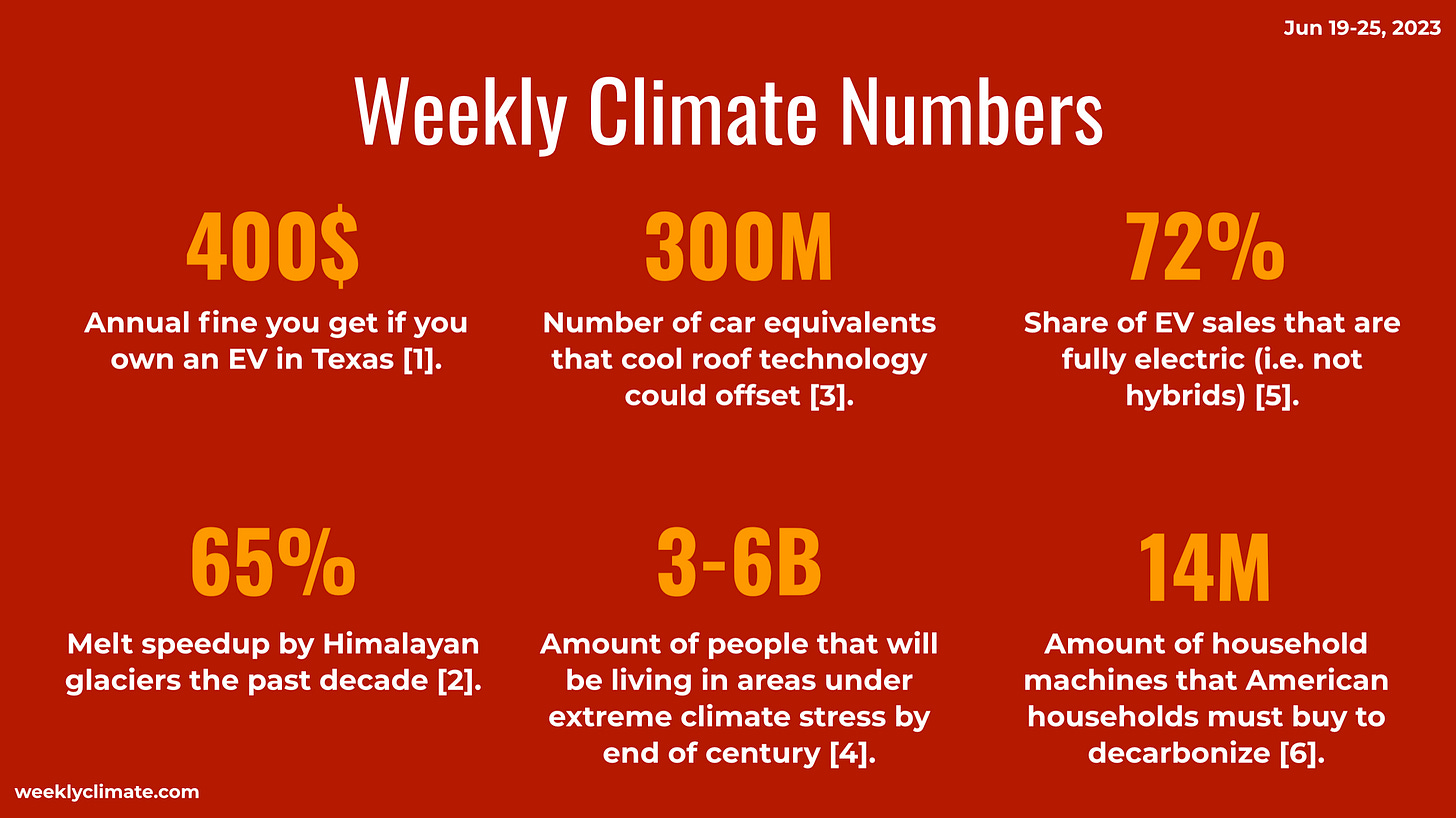THE BRIEF [Jun 19-25’23]
3-6B people living under climate stress by 2100, virtual power plants making an impact, great EV data explorer and loss of fossil fuel assets have no impact on general public.
Welcome to this week’s edition of The Weekly Climate 🎉
References: [1], [2], [3], [4], [5] and [6].
If you’re only getting The Brief but want to get the full version of the newsletter be sure to upgrade your plan to paid. Check out the preview that you will receive to see why more than 30 people think it’s worth paying for. And see a recent week’s full newsletter for details for why I decided to go paid.
If you’re getting both: Thank you so much for deciding to upgrade to go paid 🙏. And thanks to everybody for reading my newsletter regardless of which version you read 🤗.
‼️News you can’t miss
Here’s one important scary/bad (🙀), good (😻), interesting (😼) and fossil (💩) news item.
🙀 3-6B people may be living in less than optimal environments by 2100
😻 Virtual power plants are starting to matter
😼 Great EV data explorer on sales, charging points and more
💩 Loss of fossil fuel assets will not impoverish general public
This week’s highlights
[#heatwave] — A heat wave in Texas pushed the power grid to its limit, but renewable energy and battery storage helped prevent blackouts. Solar power and batteries filled in gaps when coal and nuclear power plants went offline. Climate change has made extreme weather more intense, and a new analysis found that global warming made the extreme heat in Texas at least five times more likely to occur. Despite the success of renewable energy in preventing blackouts, Texas leaders continue to push for more fossil fuel power plants.
[#aviation] — Airbus is making progress in its decarbonization ambition with two hydrogen-based propulsion technologies: hydrogen combustion and hydrogen fuel cells. Recent achievements include a proof-of-concept of a hydrogen conditioning system and a hydrogen fuel cell engine concept that achieved 1.2 MW, the power needed for one engine at take-off.
[#climatefinance] — The Paris climate finance summit failed to deliver a debt forgiveness plan for poorer countries struggling with a growing debt crisis. While progress was made on reforms to address the climate emergency, few concrete measures were agreed that would make a difference now. The World Bank will pause debt repayments for countries struggling with climate disaster, but only on new loans. About $100bn is to be provided to poorer countries through special drawing rights, a form of currency provided by the International Monetary Fund. However, this is separate from the $100bn a year in dedicated climate finance that poorer countries have been promised to help them cut greenhouse gas emissions and adapt to the impacts of the climate crisis.
[#fossilfuelassets] — New research shows that a rapid reduction in fossil fuel production, essential to avoid the worst impacts of climate breakdown, would have minimal financial impact on the general public (counter to what the fossil fuel industry usually peddles). The study found that the bulk of financial losses associated with fossil fuel assets would be borne by the wealthy, with only a small share borne by the working and middle class. Governments could easily compensate for the minimal impact on those on middle and lower levels of wealth, making rapid action feasible and relatively low cost
That’s it for this week folks!
If you want more details or simply think my newsletter rocks remember that you can always go paid to get the full version of the Weekly Climate. But before you do, ask yourself this question: Does it provide you with 1.25$ worth of value every week? Obviously I think it does. In fact I really hope that just the time alone I save you should easily cover those 1.25$. Don’t hesitate to ping me on michael@weeklyclimate.com or comment below with any questions, feedback or comments regarding this.
Remember if you’re feeling down, angry or sad from some of the news in this newsletter one cure is to act. And one way you can always act that also happens to be one of the most powerful things you can do is to talk about it. That also works if what you just read made you hopeful or happy btw.
If you enjoyed this newsletter don’t forget to share it with your friends, coworkers or other people you think could benefit from getting it. If you got directed here by a friend or another link on the Internet don’t forget to subscribe!
See you all next week 👋


